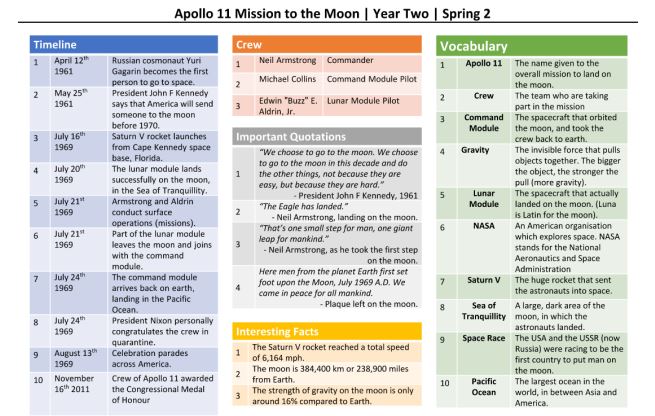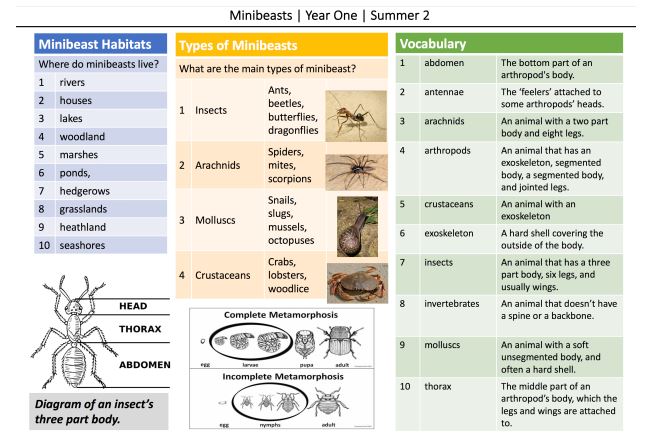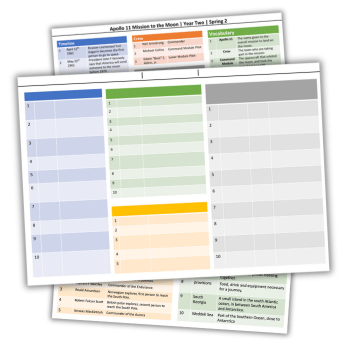PowerPoint template and examples
KS1, KS2, KS3, KS4
Years 1-11
Use this knowledge organiser template from Jon Hutchinson to create documents for your own classroom…
Every topic at Reach Academy Feltham, has knowledge organisers at its heart. These are both the anchor and the lodestar of any unit of work.
Each knowledge organiser is a single sheet of A4 paper with all of the essential facts that together represent the schema of a topic. Use this knowledge organiser template to sort the facts into sections, with each knowledge item concise.
Knowledge organiser template
Whether it’s the Tudors or tectonic plates, we begin by meticulously listing everything we expect every child to know. This can require a little subject knowledge development from teachers, researching the unit to curate and organise those essential facts.
Quickly, we find that these facts can be chunked into different sections on our knowledge organiser template (for example ‘key vocabulary, ‘important people’ or a ‘timeline’).
The key with a knowledge organiser template is brevity. Keep individual facts snappy. It is difficult to remember long paragraphs, and so this knowledge organiser template has space for very short summaries – for instance ‘Winston Churchill: British Prime Minister during WWII from 1940-1945’.

Explanation and elaboration will come in the lessons, with the item on the knowledge organiser a useful primer and aide memoire for pupils.
Images and diagrams
Images, maps and diagrams may be necessary for certain topics, but they take up a lot of space and so only include them if absolutely necessary.
Linking between topics
Knowledge organisers have a hidden value. With the exact content in any given unit set out so transparently, links can be made between different topics.
When our pupils study Roman Britain in Y4, they learn about the fall of the Roman Empire in the fifth century. However, their teacher knows that in Y3 they will all have learnt about the collapse of the Shang Dynasty in Ancient China in 1046 BCE.

Thus, explicit links can be drawn, giving pupils multiple concrete examples of building and maintaining an empire. They will encounter this theme again when studying the Benin Kingdom of West Africa in Y5.
These conceptual links can only be established with clarity around exactly what is being learnt in each unit.
Benefits of knowledge organisers
Knowledge organisers are valuable for senior leaders, as well as teachers and pupils, because they provide a more coherent and sequenced curriculum that is mapped over years, not only weeks.
We should be clear – knowledge organisers are not a silver bullet. They do not, by themselves, constitute a curriculum. That glorious cathedral must be built with all manner of materials, borne from a range of thoughtful minds.
However, when carefully written and intelligently implemented, they can form the very foundation stones from which we build. Why not give them a try in your next topic?
Jon Hutchinson is director at Reach Academy. Follow him on Twitter at @jon_hutchinson_. Read more from Jon about curriculum building.

Similar resources
- Buddhism charity KS2 – Explore dāna (Buddist generosity concept)
- Solubility KS2 – Investigate solubility with common ingredients
- Fast fashion effects on environment – Fashion show art lesson
- Cobweb by Michael Morpurgo – Cross-curricular activities for KS2
- Refugee poem – Lesson plan for the poem ‘Unbroken’













